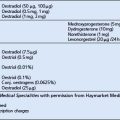CHAPTER 2 OBSTETRICS
PRECONCEPTUAL COUNSELLING
Assessment
Management
Advice
Smoking and alcohol.
Women should be advised to stop smoking and to reduce their alcohol intake to a minimum.
Diet and nutrition
Referral
Obstetric problems
Medical problems
BOOKING VISIT
PRENATAL SCREENING AND DIAGNOSIS
SCREENING TESTS
All women may be offered ultrasound, serum AFP and the triple test or integrated test as part of routine screening. Discussion of the pros and cons of these tests must take account of the patient’s feelings regarding termination of pregnancy. False-positive results can cause considerable unnecessary anxiety. Diagnostic tests are necessary to confirm a positive screening test.
Ultrasound
BLEEDING IN EARLY PREGNANCY (<14 WEEKS)
Diagnosis
History.
Management
For vaginal spotting without pain:
For vaginal bleeding with pain:
If the miscarriage is complete (i.e. products have been passed and the pain and bleeding have settled):
VARICOSE VEINS
Varicose veins tend to worsen with each pregnancy.
Management
GLYCOSURIA
Misleading detection of postprandial glycosuria can be avoided by testing an early morning specimen.
RHESUS-NEGATIVE MOTHERS
POSTPARTUM BLEEDING
If the lochia remain red but bleeding is mild, consider using oral ergometrine 500 μg tds for 3 days. Co-amoxiclav 1 tds for 7 days may be useful in suspected endometritis (see below).



